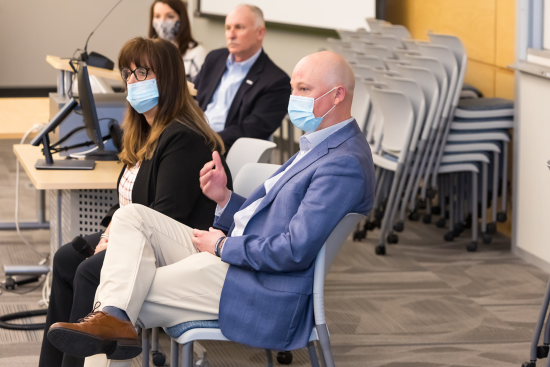
Legislators, Business Leaders Talk Pharma Manufacturing at Pitt CC
[Editor’s note: This story was written and published on Feb. 25 by Pitt Community College]

Pitt Community College administrators welcomed state legislators and local business leaders to campus Thursday for a discussion centered on the college’s efforts to develop a skilled regional workforce and its future goals and needs.
On hand for the meeting, which included tours of PCC’s Biotechnology and Industrial Systems training areas, were Sen. Deanna Ballard and representatives Julie von Haefen and Chris Humphrey. They were joined by Thermo-Fisher’s Tommy Schornak and Christine Coates, Mark Phillips from the N.C. Biotechnology Center’s Eastern Region Office, and State Board of Community Colleges member Shirley Carraway.
“We want to show you what we do and let you see our facilities,” PCC President Lawrence L. Rouse told attendees before thanking state legislators for their support of community colleges in the current state budget.
PCC Board of Trustees Chairman Gary Evans followed Rouse by noting Pitt is a regional school that relies heavily upon support from state legislators and Pitt County Commissioners to carry out its educational mission. He said for PCC to continue developing a pipeline of skilled workers, the college will have to address its facility needs.
“We’ve got to have legislative help to get where we want to be,” Evans said, adding that eastern North Carolina’s workforce must be prepared to help area business and industry compete with companies around the globe in order to keep those employers “here and thriving.”
Dr. Tom Gould, PCC Executive Vice President of Academic Affairs and Student Services, picked up where Evans left off, saying, “without workforce development, there will be no economic development” in North Carolina.
Gould said community colleges have been trying for years to convince potential students they don’t necessarily need a four-year degree to secure a good-paying job. Many, he said, are finally starting to realize “70% of all new jobs require either a certificate or associate degree.”
During a roundtable discussion that followed opening remarks, Coates said PCC was Thermo-Fisher’s strongest supplier of skilled workers, whether they’re lab technicians, HVAC workers or electricians. “We need you more than we need anybody else,” she said.
As Thermo-Fisher’s Human Resources director, Coates said the company experiences less employee turnover when it hires people from eastern North Carolina. “Not only are you producing the employees that we need, you’re producing employees that are staying,” she said.
